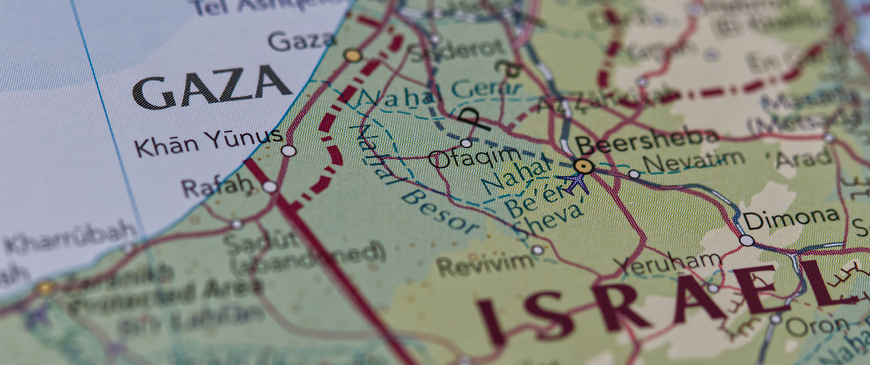The effects of the Gaza war are spilling over into countries across the Middle East, including Iraq, Syria, Lebanon, and Yemen.
This ECFR mapping project sets out the domestic and regional dynamics driving these interconnected conflicts – including the underlying confrontation between Iran and its allies against the United States and Israel.
The Gaza Crisis identifies key hotspots and potential triggers of further escalation. It suggests ways for European policymakers to calm tensions and prevent deeper regional conflict.
GAZA
Escalation epicentre
Gaza is engulfed in fighting, death, and destruction. Five months after Israel launched its military offensive in response to the Hamas-led attacks on Israeli civilians on 7 October, over 30,000 Palestinians have been killed. Much of the Gaza Strip lies in ruins, with the risk of famine growing, and 1.7 million people – three-quarters of the population – forcibly displaced. Israel’s military campaign has damaged Hamas, but it is unlikely to uproot the Islamist group from Gaza entirely. The campaign is, however, exacerbating a catastrophic humanitarian crisis. With over a million Palestinians trapped along the border with the Sinai peninsula, the conflict could pose major political, security, and economic risks to Egypt’s domestic stability. Egypt, Qatar, and the United States are continuing their mediation efforts to broker a pause in fighting to release the remaining Israeli hostages and increase aid flows to the strip. But the lack of a political roadmap for post-conflict Gaza remains a core impediment to achieving this and any long-term stabilisation. Without a sustainable ceasefire, Israel risks becoming trapped in an unwinnable drawn-out war against Hamas that will only prolong Palestinian suffering and cause conflicts to escalate elsewhere in the region.
What Europeans should do
In the absence of a viable military solution and with humanitarian costs mounting, Europeans should continue pressing for an immediate cessation of hostilities, combined with the release of Israeli civilian hostages and a surge in humanitarian support for Gazans. But without a long-term political track, any pause in the fighting will only provide limited respite. Europeans should therefore use a ceasefire to wedge open space for a wider diplomatic pathway to stabilise Gaza.
The Palestinian Authority (PA) remains the only body that can conceivably take over the governance and security control of Gaza in the long term. But it will likely fail if pushed too quickly: it has long been absent from Gaza and is facing profound domestic crises (many of its own making) in the West Bank, where it is based. Europeans should focus on re-legitimising the PA, steering it away from its increasingly autocratic tendencies and boosting its public
support in both the West Bank and Gaza. This cannot simply mean strengthening the PA financially and militarily, but also addressing the need for deep-rooted reforms. However, in supporting Palestinian domestic transformations, Europeans will have to factor in that Hamas will likely remain a core part of the Palestinian national movement.
Europeans will also need to work with the US and regional actors to establish a reinvigorated political track to address the overarching Israeli-Palestinian conflict. A credible diplomatic pathway for securing Palestinian self-determination remains the best means of siphoning away support for Hamas and ensuring lasting security for Israelis and Palestinians. Without a viable horizon to end Israel’s occupation of Palestinian territory and secure Palestinian self-determination, there is little prospect of ending the cycle of conflict.
Read the full analysis at the original link
About the authors:
Julien Barnes-Dacey is the director of the Middle East & North Africa programme at the European Council on Foreign Relations. He works on European policy towards the wider region, with a particular focus on Syria and regional geopolitics.
Cinzia Bianco is a visiting fellow at the European Council on Foreign Relations, where she is working on political, security and economic developments in the Arabian Peninsula and Gulf region and relations with Europe.
Hugh Lovatt is a senior policy fellow with the Middle East and North Africa Programme at the European Council on Foreign Relations. Lovatt has focussed extensively on regional geopolitics and advised European policymakers on the conflicts in Israel-Palestine and Western Sahara.


